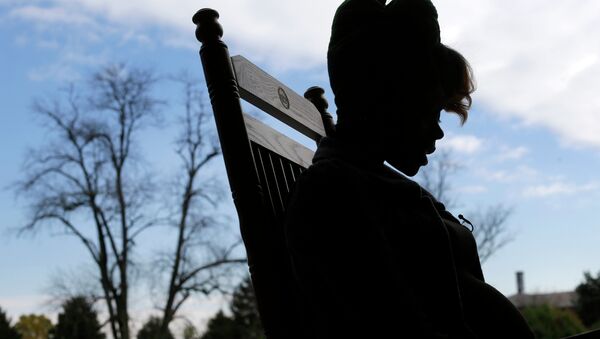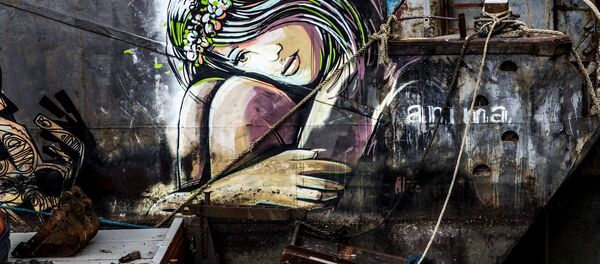"Even though I had a letter from the government saying I was a victim of exploitation, it took over three years of court appeals before I was finally granted leave to remain in the UK." Hanh, which isn't her real name, said in a statement obtained by Sputnik.
Hanh is one of hundreds of children who have been been duped and trafficked from Vietnam to China and across Europe to be sexually exploited in Britain only to have their ordeal extended in circumstances beyond their control.
Over 40 million people around the world are victims of #modernslavery today. Mary’s story is just one of many that illustrates why this must stop. #antislaveryday #UKaid pic.twitter.com/JxEyb4smZQ
— DFID (@DFID_UK) October 18, 2018
However Hahn did eventually receive support and therapy through ECPAT UK, a charity dedicated to helping child victims of exploitation and trafficking. The charity claims the UK's current system to support children has "major gaps."
"While adult victims receive specialist support…child victims are placed into the care of local authorities who receive no additional funding to meet their complex needs," Debbie Beadle, ECPAT UK's director of programmes, said in a statement.
"This means that many children suffer without the assistance they need to recover and move on from their trauma, and they may be vulnerable to re-trafficking and further exploitation," Debbie Beadle said.
READ MORE: 'Dire' Specialist Support for UK Child Victims of Slavery, Charity Tells Sputnik
Hahn escaped her captors and found a police station where she was officially identified as a victim of human trafficking as defined by the NRM, the National Referral Mechanism, but continued to live in fear that she would be sent back to Vietnam and back into the clutches of her traffickers. "I can't think about what they would do to me as they will know that I talked to police."
Hanh thought her tortuous ordeal was over but due to a lack of support for vulnerable children underpinned in Britain's Modern Slavery Act, she was left struggling to rebuild her life and let down by people who should have helped Hanh access counseling services and therapy.
"I was having a lot of nightmares and was feeling very down about what happened to me. I cried a lot," says Hanh.
"My social worker and her manager made me believe that I couldn't have counselling. I didn't understand my right to ask for counselling so I just didn't ask them again. My foster carer saw how sad I was, but also didn't help."
Anti Slavery Day 2018
Hahn and child victims of trafficking like her are delivering a petition to the prime minister on Anti Slavery Day 2018 demanding guaranteed specialist support for trafficked children.
.@ECPATUK is marking #AntiSlaveryDay2018 by delivering a 112,000 strong petition to @GOVUK, demanding guaranteed specialist support for #trafficked children.
— ECPAT International (@ECPAT) October 18, 2018
Inadequate & inconsistent services nationwide are leaving vulnerable children with little support.https://t.co/Q3P944hqhz
Victim Support Bill
A Modern Slavery (Victim Support) Bill proposes an amendment to the Modern Slavery Act 2015 to ensure more support for victims, the Victim Support Bill is due for its second reading in the House of Commons in November.
The Bill would provide a year of guaranteed support for victims of modern slavery along with an advocate to help victims rebuild their lives.
Today is #AntiSlaveryDay. If you suspect that someone is a victim of #Slavery or is being exploited, report it: https://t.co/8RGSMx4CqG#ModernSlavery #HumanTrafficking pic.twitter.com/OCbjB98nmK
— Home Office (@ukhomeoffice) October 18, 2018
ECPAT UK is calling for the government to overhaul the NRM to make it work with existing child protection structures and provide youngsters with a legal guardian and access to counselling, lawyers, specialist accommodation and access to compensation.
READ MORE: UK Exploitation Revealed: 'Where Traffickers Flourish and Children Suffer'
County Lines
The number of child victims of modern slavery in Britain has risen by 66 percent, according to statistics released by the National Crime Agency. A total of 5,145 potential victims were referred via the NRM in 2017, the largest number of child victims were British.
Reports of children linked to cases of modern slavery in Britain has risen from 1,278 in 2016 to 2,118 in 2017. The surge in numbers is increasingly linked to the rise in children exploited through county lines and an increase in the number of unaccompanied asylum seeking children referred to the NRM.
READ MORE: Surge in Child Exploitation in UK Sees Record Number of Slavery Victims
So called "County Lines" is fast becoming a phenomenon affecting rural villages, towns and cities across the UK. Drug gangs deliberately target vulnerable children living in care homes or trapped in poverty in unloved environments and exploited.
Gangs groom, threaten and trick children into trafficking drugs for them, trapping them. However the young people exploited through county lines are often seen by professionals as criminals, not victims.
Charity Children's Society is calling for these vulnerable children, estimated to number around 46,000 in England who are being exploited through county lines, to be recognized as victims of trafficking and exploitation, not criminals.
Modern Slavery
Some police forces in England and Wales are using the UK's Modern Slavery Act to prosecute drug dealing gangsters who exploit vulnerable children; however, not all forces respond in the same way. Wiltshire Police confiscate the trainers of the children found to be dealing drugs to send a message that crime doesn't pay.
"We will always deal robustly with anyone involved in the supply of class A drugs in order to show gangs from out of town that they cannot view our county as a soft target to commit crime," Detective Constable George Booth at Wiltshire Police said in a statement.
READ MORE: Poverty Forces Kids from Big Cities into Drug Dealing in Small Towns — UK Report
Britain's passed its Modern Slavery Act in 2015, described at the time as "historic," however the act doesn't legally guarantee specific support trafficking and slavery victims ought to receive.



